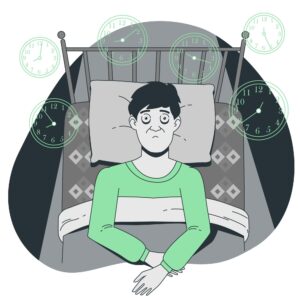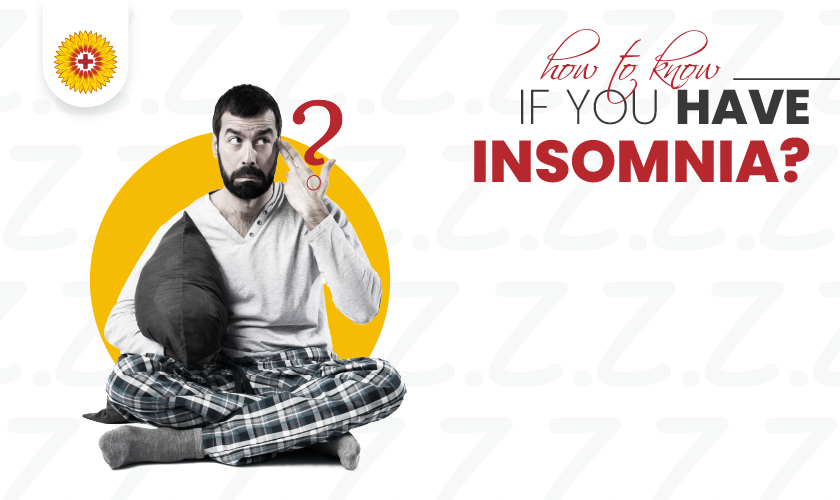Insomnia makes it hard to function well or feel good mentally, or even physically.
Around 10% to 15% people have chronic insomnia, which makes it a health concern.
Treatments for insomnia can include:
- Medication management.
- Therapy options.
- Making healthy and positive changes to your lifestyle.
If you’ve been battling poor sleep, you should speak to a professional to help you tackle insomnia symptoms.
Please visit Urgent Care of Kansas if you need mental health care.
Listed below are helpful tips for overcoming insomnia.
What is Insomnia?

Insomnia is sleep disorder where a person experiences difficulty falling asleep. It means getting poor quality or inadequate quantity of sleep.
According to the NIH, bout 30-40% of adults experience insomnia symptoms sometimes.
It can be considered chronic if symptoms end up lasting for over three months.
Treatment is intended to address the underlying causes through:
- Lifestyle changes.
- Cognitive behavioral therapy.
- In some cases, medication to re-establish a healthy sleep pattern.
Insomnia Symptoms
- It takes you a long time to fall asleep.
- Your sleeping patterns are off and you can’t get back to sleep if you wake up during the night.
- You feel tired and unrested all the time.
- Lack of sleep makes you more stressed and unable to focus.
- You wake up before your alarm goes off and you can’t fall asleep again.
- Your sleep feels light.
- You move around a lot at night.
- You can’t remember things or focus well.
- You feel wiped out and sluggish when awake.
How to Know If You Have Insomnia?
If you’re unable to fall asleep asleep, can’t stay asleep, wake up too early, feel tired during the day, and experience difficulties with concentration or mood, you might have insomnia.
If you experience these symptoms, please consult your healthcare professional to get a correct diagnosis and treatment.
Tips to Prevent Insomnia
1.Eliminate Alcohol and Stimulants
It’s important not to take caffeine or alcohol right before bedtime. Alcohol can make you feel sleepy at first but later, it messes up your sleep because your body gets rid of the alcohol.
Coffee, tea, and energy drinks all have caffeine.
Drinking caffeine, even if you drank it earlier, can make you feel restless and awake for hours.
To help your body get used to a sleep schedule, don’t drink caffeine at least 6 hours before bed.
Caffeine and alcohol trick the brain into thinking that it is time to be awake rather than asleep.
2.Limit Naps
Naps are a good way to compensate for lost sleep but ineffective.
It’s important to have a set sleep schedule where you go to bed and wake up at the same times daily.
Napping can interfere with keeping a regular sleep pattern if not done right.
It’s best to nap earlier, like in the afternoon.
Napping close to bedtime may make it harder to fall asleep at your regular bedtime because it doesn’t give your body enough time to get tired again.
3.Exercise Regularly
Exercising your body during the day is good for helping you sleep at night. When you move around a lot, your muscles get tired.
Even a 30-minute walk can help. You don’t need to do anything hard or push yourself too much.
Light exercise like walking or stretching is perfectly fine. The important thing is getting your body moving.
Try exercising in the morning or afternoon, not right before bed.
Moving wakes your body up. If you exercise too close to bedtime, it may be tougher to settle down and sleep.
4. Limit Eating Before Going to Bed
Your body needs rest when you sleep. Big meals before bed make your stomach work overtime.
When you eat, your body uses energy to break down the food. Breaking down food takes energy. This keeps your body from resting well.
Give your body a few hours after eating dinner. This gives your tummy time to finish its work.
A small snack is satisfactory. But big, heavy meals can stop you from sleeping well.
Leaving time between dinner and bed helps your body calm down. After that, your body is ready for sleep.
5. Reduce Stress
When you feel worried, your body tightens up. It’s hard to relax and fall asleep.
Breathe slowly in and out. Slow breathing helps your body feel loose.
Take a warm bath. Baths can help you calm down.
Do something gentle, like looking at pictures before bed. Thinking about nice things distracts from worries.
Tell a friend if something is bothering you inside.
Getting less worried helps your body feel comfy.
How to Adjust Your Sleep Schedule?
Here’s what you can do:
- Try to keep your bedtime and wake-up times steady every day – even on weekends. This helps your body get used to a sleep pattern.
- Choose what time you want to go to bed and wake up. Make sure you sleep enough, atleast for 8-9 hours.
- Having a set time to wake up each day helps. You can then gradually improve your bedtime over time.
- It takes a while for your body to adjust to a new sleep schedule. Stick with it even if changes take time to happen.
- Following a schedule gradually over weeks is better than fast changes. Be consistent in resetting your circadian rhythm.
What Is the Ideal Time to Go to Bed and Wake Up?
There’s no perfect time for everyone. Try to sleep when it’s dark out at night and wake up at sunrise if possible.
Ideally, your schedule should coincide with daylight hours. But sunrise and sunset change a lot based on where you live.
The most important things are:
- The time you go to bed and wake up every day should be the same, even on weekends. This helps your body get used to a schedule.
- You should sleep for at least 8 hours each night. Most grown-ups need between 8-9 hours of sleep.
- Sleep at night and wake up in daylight if you can.
Choose times that allow you to sleep enough hours each day in a routine that your body can adapt to.
To get more useful tips and additional knowledge, you can visit WebMD.
Final Thoughts
How do you know if you have insomnia? You might have insomnia if you have trouble sleeping at night and feel tired or sleepy during the day.
Sleeping well is essential to one’s mental and physical health.
If you’re not getting sufficient sleep or your sleep quality is poor, it can negatively affect you.
Make positive changes to your sleep habits. If insomnia severely affects you and your routine, please get professional help for guidance.For support and treatment for insomnia, please reach out to Urgent Care of Kansas.
FAQs
How can you test for insomnia?
There are two ways to test for insomnia:
- Keep a sleep diary for two weeks. Write down when you go to bed and wake up and how long it takes to fall asleep.
- Consult a mental health professional. They can check your sleep diary and ask questions to diagnose insomnia.
How many hours of sleep is insomnia?
There are a couple of signs of how many hours of sleep might mean insomnia:
- Getting less than 6-7 hours of sleep per night could be a sign of insomnia.
- Waking often and struggling to fall back asleep even when getting more hours might also point to insomnia.
What are the three types of insomnia?
There are three main types of insomnia:
- Difficulty falling asleep.
- Difficulty staying asleep.
- Early morning awakening.
How to cure insomnia quickly?
Few things that you can try to cure insomnia quickly:
- Create a relaxing bedtime routine.
- Avoid screens before bed.
- Stop caffeine and nicotine late in the day.
- Practice relaxation techniques.
- Avoid large meals, alcohol, and intense exercise before bed.



No comment